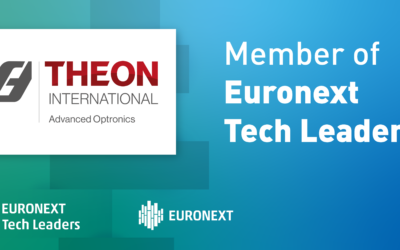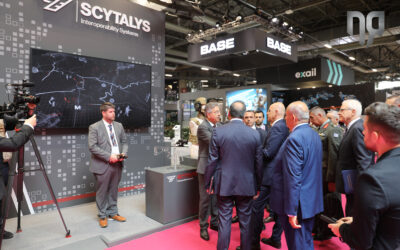THEON INTERNATIONAL PLC (THEON), one of the leading manufacturers of night vision and thermal imaging systems for defence and security…

The members of the Hellenic Entrepreneurs Association (E.E.N.E.) participated in a roundtable discussion entitled “Ideas, Positions and Examples for the Promotion of Hellenic Entrepreneurship”. The said discussion was held in the framework of the 9th Delphi Economic Forum on Friday, April 12.
The President of E.EN.E., Mr. Christian Hatziminas, who argued that the contribution of businessmen to the public debate is of crucial importance for the presentation and highlighting of vital issues concerning Greek businesses, opened the discussion.
Then an overview of the course of the Greek economy for 2023 followed, in relation to the EU, as well as estimates for its development in the next two years. It was observed that Greece grew at significantly faster rates than the average of EU countries and it is estimated that it will continue its course in 2024 and 2025.
However, the importance of focusing on the perspectives of the Greek economy with a five/ten-year horizon was emphasized, which E.EN.E. argues that it should be based on reforms related to the industry sector, the upskilling and reskilling of personnel as well as smart tax incentives.

In the context of these positions, statistics were presented showing that the Greek industry is well behind the corresponding EU average. For example, the Gross Added Value of the Greek industry is at 8.8% of the GDP compared to the 27-member EU which shows a rate of 14.7%. Also, Greece seems to lag significantly behind countries such as Spain and Portugal in investments in mechanical equipment, while exports of industrial products are at much lower levels than countries with similar populations.
At the same time, the expenditure of Greek companies in research and development approaches 0.73% of GDP in relation to the corresponding 1.48% in the EU. Finally, Greece is in fourth last place in terms of the number of robots used per employee in relation to the rest of the EU economies indicating its lagging behind on the automation pillar.
In addition to the statistics referring to the country’s industry, data showing Greece’s position in DESI scores which are related to human resources and show Greece to be in 22nd place (out of 27), while the rank regarding companies that offer their employees training in technical skills was 12% in 2022 compared to 20% of the EU.
All of the above makes the positions of the Association more relevant than ever. Positions that focus on pillars, such as deindustrialization in the most competitive terms, i.e. allied with technology and in a broad sense that also includes the shipping and tourism sectors, which produce high added value. Re-industrialization is part of the compass for dealing with the productive deficit, in combination with the strengthening of the extroversion of Greek businesses.
Also read: EFA Group | “Greek defence technology ranks on top internationally”
In addition, the need to create a coordinating body for the implementation of a single national industrial policy was emphasized. This pillar is inextricably linked to human resources and digital skills. Therefore, it is important to invest in the upskilling and reskilling of human resources in terms of technology and digitization, which is directly linked to reindustrialization.
In this direction, it is extremely important to give incentives to companies for the digital training of their employees as well as to reward employers who have increased jobs and invested in digital skills, through the reduction of non-salary costs. Specifically, the proposal of E.EN.E. concerns a brave reduction of non-salary costs, in employment, which will be shared between businesses and employees, with the latter also receiving a digital certificate.
Such targeted reinforcement of upskilling will be effective, as it utilizes incentives that start from the bottom up and not the other way around, as is usually the case with European and state funds, while directly connecting businesses to the training process.
Furthermore, it was mentioned that, as E.EN.E. has repeatedly expressed, investments by foreign multinational companies are welcomed, like those of the tech giants, in our country, but it must be taken into account that a great workforce will be absorbed by these companies and consequently Greek small- and medium-sized enterprises will be deprived of the services of this Greek talent.
It is thus important that these foreign multinationals return to Greek small- and medium-sized enterprises through “compensatory” initiatives, the corresponding technological training of other workers (who are not hiring) in even simple digital skills.
In addition, the need to remove certain disincentives for business development was discussed. For example, the need to reduce advance tax is considered imperative as this measure penalizes development. Even more important is the possibility of increasing the rate of depreciation in mechanical equipment from 10% to 20% per year.
Finally, as an incentive for development, the position of the Union regarding marginal taxes was presented. More specifically, in a defined development context there may be a reduced general corporate profit tax (e.g. to 10%) for the additional profits recorded from one year to the next, possibly using the average of the last three or five years.
Also read: EFA GROUP | Christian Hatziminas: an “Internationally Growing Entrepreneur” in the EY Competition
Representatives of political parties, Mr. Manolis Kefalogiannis, Mr. Manolis Christodoulakis and Orestis Omran, attended and addressed a multitude of issues. Mr. Kefalogiannis referred, among other things, to new technologies and artificial intelligence, emphasizing also that Greece is moving along axes of European orientation, parliamentary character and free economy.
Mr. Christodoulakis referred to the fact that according to a survey, Greek businesses cite as key problems the difficulty of finding specialized personnel with technical and digital skills, the high cost of production and labor as well as the deficit to the ability to access funding tools. He also stated, among other things, that in order for taxation to provide incentives, they should have a macroeconomic impact and be linked to employment.
At this point, giving an example of linking tax incentives with employment, he spoke about his perspective that instead of the employer deducting 100% of his employer’s costs, there should be a 150% deduction, underlining the position of E.EN.E. on the need to link such measures specifically with investments in digital skills. Such incentives are indirect reductions of non-salary costs and find E.EN.E. an ally and ardent supporter.
Mr. Christodoulakis also argued that through employment support, the further reduction of non-salary costs is allowed. Such specific proposals that are consistent with and reflect the emphasis placed by E.EN.E. on the need to immediately reduce non-salary costs, find E.EN.E. an ally and advocate.
Finally, he referred to the need to reform the justice system, connect academically produced work with the labor market and create retaining structures for the existing human resources, alongside the need to shift the model of the Greek economy towards the industry sector. These are positions also closely related to those of E.EN.E. and which the Union welcomes and salutes.
READ MORE
Racing “patrol vehicle” of the Hellenic Police hits the road – VIDEO
The motor sports competition team of the Hellenic Police was seen a few days ago in the city of Kalamata. The race of the “patrol vehicle”…
THEON INTERNATIONAL’s MIKRON Night Vision Goggles make Netflix debut
THEON INTERNATIONAL announced that its cutting-edge Night Vision Goggles MIKRON have made a thrilling appearance…
EUROSATORY 2024 | Missile Artillery Solutions from MBDA
With such a large number of interested attendees at MBDA’s pavilion at the Eurosatory 2024 Defence exhibition, the stand reminded of an…
KNDS | Showcases full range of LEOPARD battle tanks at EUROSATORY
KNDS continues to expand its technological advantage in the field of main battle tank development, as we have witnessed at the Defence and…
THEON SENSORS | Distinguishing appearance at EUROSATORY 2024 with new range of products
THEON SENSORS attended the International Defence and Security Exhibition EUROSATORY 2024 as an ambassador of Greek innovation…
Ministry of Defence | Organization of Hellenic EDF Info Day
A Conference entitled “EDF Info Day” is organized in the Amphitheater of the National Gallery on Tuesday, July 9 from 09:00 to 17:00.
ALTUS LSA | Participates in EUROSATORY 2024 with KERVEROS in the foreground
The participation of ALTUS LSA in EUROSATORY 2024 is among the Greek participations of operational significance.
Freddy Beleris | Ιn jail until October
The elected mayor of Heimarra and Member of the European Parliament of New Democracy will remain in prison until October…





















